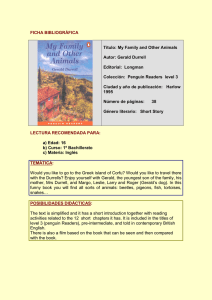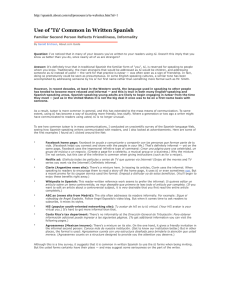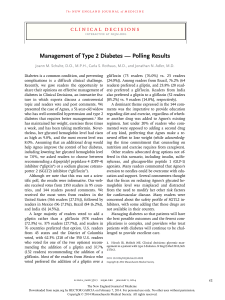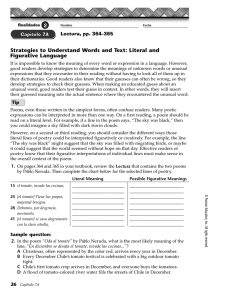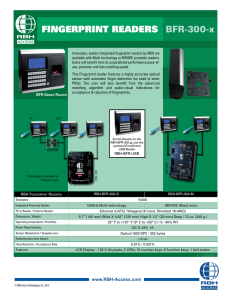The Earthquake by Elizabeth Laird - Victoria University of Wellington
Anuncio
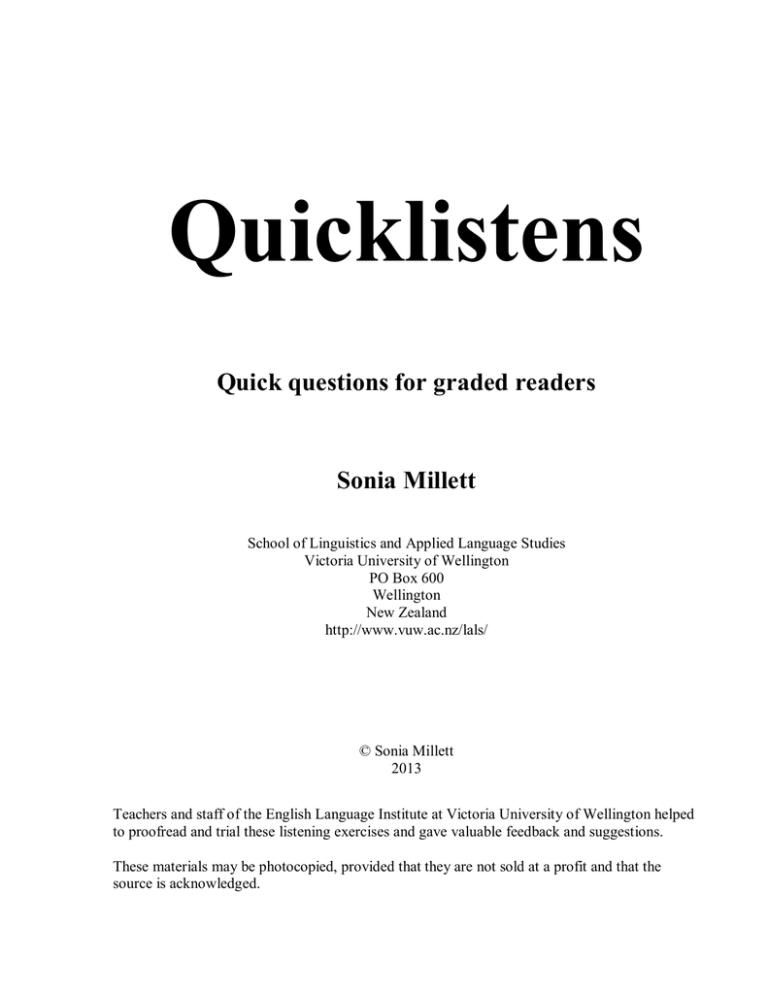
Quicklistens Quick questions for graded readers Sonia Millett School of Linguistics and Applied Language Studies Victoria University of Wellington PO Box 600 Wellington New Zealand http://www.vuw.ac.nz/lals/ © Sonia Millett 2013 Teachers and staff of the English Language Institute at Victoria University of Wellington helped to proofread and trial these listening exercises and gave valuable feedback and suggestions. These materials may be photocopied, provided that they are not sold at a profit and that the source is acknowledged. Quicklistens For several years teachers on the English Proficiency Programme at Victoria University of Wellington have incorporated a daily fluency programme (Millett, 2008) into their classes. The EPP is an English for academic purposes programme which prepares international and second language New Zealand students for university study. One reason for including a daily fluency programme is that fluency development is one of four essential strands of teaching outlined by Paul Nation (Nation, 2007). The four strands are: 1. 2. 3. 4. Meaning focused input (listening and reading) Meaning focused output (speaking and writing) Language focused learning (vocabulary teaching and study) Fluency development (listening, speaking, reading and writing) Another reason is that students consistently rate the daily fluency component of the course very highly. The idea of fluency practice is that students use what they already know to say what they want to say. This means that the materials must be easy and present nothing new. Until recently, the daily fluency programme has only included three of the four language skills: 1. Quickwrites 5 minutes free writing with emphasis on fluency and flow of ideas 2. Quickspeaks 2 or 3 minutes speaking without stopping to a listening partner on the topic of the day 3. Quickreads Speed reading (Millett, 2005, Quinn, 2007) Quicklistens provide a way of rounding out the fluency programme to include all the four skills. What are Quicklistens? Quicklistens are regular, quick, focused listening exercises. They are based on ongoing stories utilising the principles of graded readers: high student interest; repeated exposure to high frequency vocabulary and grammar; and the fluency principles mentioned above. Quicklistens practise the academic and test taking skills of listening and writing answers at the same time. An additional benefit is the very useful focus on question forms. However, perhaps the main benefit gained from all the quick fluency activities is gaining the confidence to put into practice what you already know. How are they done? 1. Decide the word level of the graded reader you want to use. 2. Buy the Book/CD pack. Check the list of references to make sure you buy the correct book. Some of these stories are published at different levels. 3. Prepare the questions for the story from this booklet. You can do this in one of two ways: • • Copy sets of questions that can be given to students each day. Copy complete booklets of questions that students can keep to refer back to or preview. 4. Introduce the story. A good way to do this is to use the introduction, word list, list of chapters, maps, character descriptions or other information provided in the graded reader itself. I usually have the students read the introduction and study the word list for homework the night before getting started on listening to the first chapter. 5. Every day play a short section or chapter of the graded reader CD while the students answer the quick questions on the question sheet. 6. Go over the answers in class or include the answers at the back of the question booklet so that students can check the answers themselves. Other activities such as reviewing, predicting, focus on question grammar, pronunciation practice, class discussion of answers, summaries and pair or small group discussions may be incorporated into the activity depending on the length of time a teacher wishes to spend. The exercises The materials contain sets of questions for eight popular graded reader stories that can be used as Quicklisten exercises. There are also answers and CD guides to show where to start and finish the listening. As Quicklistens are more suited to lower and intermediate level proficiency students, the set of eight readers includes two books at the 400 head word level and four at the 600 head word level. The remaining two are at the 1200 and 1700 level. While word count level is not necessarily a good indicator of difficulty, the 400 and 600 word level books work best because at the higher levels the books get longer and take too much class time to rightly be called Quicklistens. Each of the eight graded readers contain from seven to seventeen sections. They should be used as part of a regular, preferably daily, programme. The stories 400 head words 1. The Monkey’s Paw (Fantasy and horror) Oxford Bookworms Library Stage 1 2. The Adventures of Tom Sawyer (Adventure) OUP Classics Stage 1 600 head words 3. Round the World in Eighty Days (Adventure) Penguin Active Reading Level 2 4. Northanger Abbey (Romance) Macmillan Readers Level 2 5. The Earthquake (Modern) Penguin Active Reading Level 2 6. Tales from the Arabian Nights (Short stories) Penguin Readers Level 2 1200 head words 7. The No. 1 Ladies’ Detective Agency (Modern) Penguin Readers Level 3 1700 head words 8 The Client (Mystery) Penguin Readers Level 4 References Millett, S (2008) A daily Fluency Programme Modern English Teacher 17, 2: 21-28 Millett, S (2005) New Zealand Speed Readings for ESL Learners, Book One, ELI Occasional Publication No 19, Wellington: SLALS Victoria University of Wellington Millett, S (2005) New Zealand Speed Readings for ESL Learners, Book Two, ELI Occasional Publication No 22, Wellington: SLALS Victoria University of Wellington Nation, P (2007) The four strands. Innovation in Language Learning and Teaching 1 (1), 1-11. Quinn, E., Nation P. and Millett, S. (2007) Asian and Pacific Speed Readings for ESL Learners, ELI Occasional Publication No 24, Wellington: SLALS Victoria University of Wellington The Books Round the World in Eighty Days Book/CD-Rom Pack by (author) Jules Verne, Andy Hopkins (Series Editor), Jocelyn Potter (Series Editor), (9781405884419), Longman Penguin Active Readers, Level 2 ...Classic / British English (Feb 2008) The Earthquake Book/ CD-Rom Pack by (author) Elizabeth Laird, Andy Hopkins (Series Editor), Jocelyn Potter (Series Editor), (9781408209516), Longman Penguin Active Readers, Level 2… Original / British English (Feb 2009) Tales from the Arabian Nights Book/CD-Rom Pack by (author) Hans Christian Andersen, Andy Hopkins (Series Editor), Jocelyn Potter (Series Editor), (9781405855396), Longman Penguin Readers, Level 2… Classic / British English (Feb 2008) The No. 1 Ladies’ Detective Agency Book/CD-Rom Pack by (author) Alexander McCall Smith, Andy Hopkins (Series Editor), Jocelyn Potter (Series Editor), (9781405881982), Longman Penguin Readers, Level 3…Contemporary/ British English (June 2008) The Client Book/CD-Rom Pack by (author) John Grisham, Andy Hopkins (Series Editor), Jocelyn Potter (Series Editor), (9781405882095), Longman Penguin Readers, Level 4…Contemporary/ British English (June 2008) The Monkey’s Paw book/CD-Rom Pack by (author) W.W. Jacobs, Jennifer Bassett (Series Editor), (9780194229487), Oxford Bookworms Library, Stage 1… (2000) The Adventures of Tom Sawyer Book/CD-Rom Pack by (author) Mark Twain, Jennifer Bassett (Series Editor), (9780194789004) Oxford Bookworms Library, Stage 1… (2008) Northanger Abbey Book/CD-Rom Pack by (author) Jane Austen, John Milne (Founding Editor), (9781405072465), Macmillan Readers, Beginner Level … (2005)
